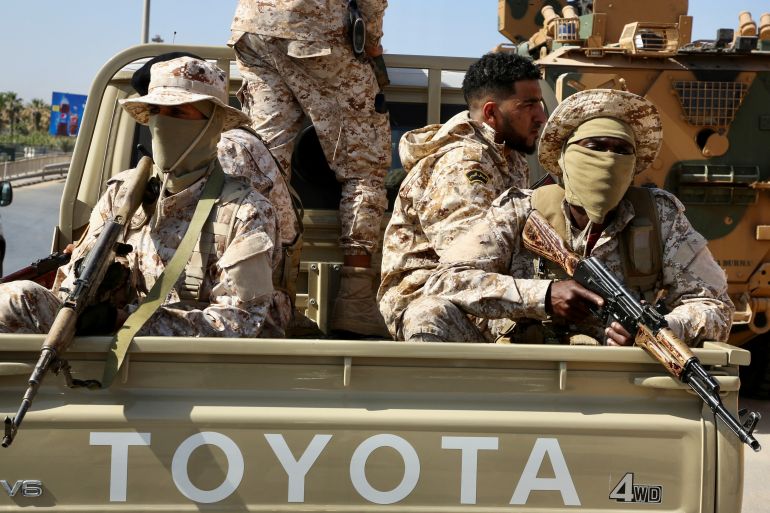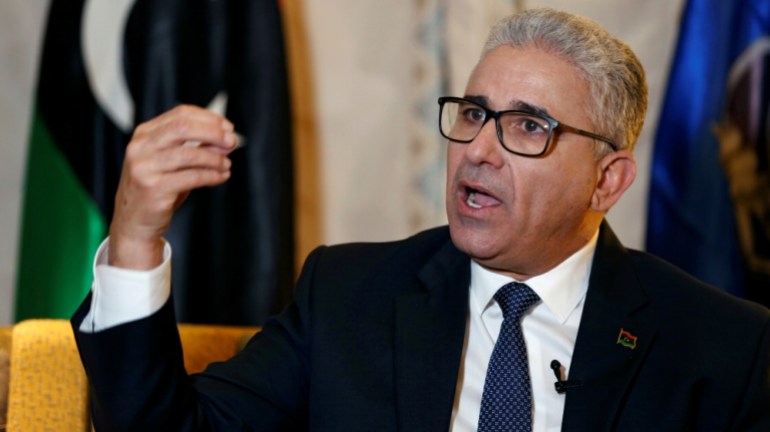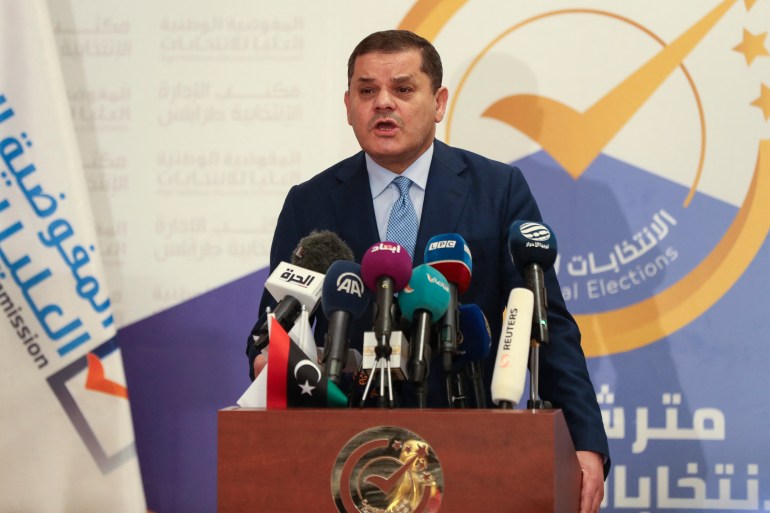Fresh Tripoli clashes underscore Libya’s political volatility
Fragile ceasefire strained as rival prime ministers jostle for power amid talks in Cairo about the future political process and conduct of elections.

Libya’s fragile ceasefire almost fell apart on Tuesday, as clashes erupted in the capital Tripoli in response to yet another attempt by the prime minister of a rival government to install himself and his cabinet.
Fathi Bashagha, who was appointed prime minister three months ago by the East-based House of Representatives, arrived in Tripoli in the early morning hours with cabinet members and was reportedly accompanied by the Tripoli-based Nawasi Brigade militia.
Keep reading
list of 4 itemsGerman far-right politician on trial for alleged use of banned Nazi slogan
The Take: After Iran struck Israel, how did Jordan and Lebanon react?
Photos: India’s Gen Z voters want jobs, harmony in world’s biggest election
The move sparked a backlash from different militias in Tripoli as gunfire broke out and the Nawasi Brigade headquarters came under attack. Bashagha subsequently left the capital less than four hours after arriving.
The development underscores the volatile environment in Libya, which has been wracked by civil war and a crisis of legitimacy following its failure to hold elections last December. The country descended into chaos after long-time leader Muammar Gaddafi was overthrown in 2011. The conflict escalated and became a proxy war involving regional powers.
The Tobruk-based parliament claims that Bashagha should now be the prime minister as the term of Abdul Hamid Dbeibah, the prime minister of the United Nations-recognised Government of National Unity, has ended.
Dbeibah, who was appointed through a UN-led process in 2021, however, has insisted that he will only hand over power to an elected government, and described Bashagha’s bid to install himself as a “desperate attempt to spread terror and chaos”.
‘Ongoing talks in Egypt’
Bashagha’s recent attempt to install his government in Tripoli was his third in three months. Yet, analysts point to the significance of the timing of this particular attempt.
“The timing is influenced by the ongoing talks in Egypt,” Yousef Bakhbakhi, a Tripoli-based academic and political commentator, told Al Jazeera.

“Cairo is hosting representatives of the Eastern-based House of Representatives and the Tripoli-based High Council of State for talks at the request of UN envoy Stephanie Williams to reach an agreement on a new constitutional framework and timeline for elections that will inevitably dissolve both institutions,” he said.
“Bashagha fears a real possibility that he could be sidelined in any agreement and is therefore eager to impose a de facto reality that scuppers the UN’s efforts to create a new legitimacy and hold elections that would effectively end the legitimacy of the current House of Representatives [that appointed him] and the High Council of State.”
Reports emerged on Tuesday suggesting that the delegations in Cairo had come to a preliminary agreement regarding a future road map that might see elections held within 12 months, and that would see both Dbeibah and Bashagha’s governments replaced by a new unity government.
Al Jazeera has, however, not been able to independently confirm the reports.
Tripoli-based political analyst and commentator Mahmoud Ismail Ramli believes that the Cairo talks, and the latest failed attempt to install a new government in Tripoli, “can be seen as the beginning of the end of Bashagha as far as his ambitions to become prime minister are concerned”.
Yet, some view Bashagha’s departure from Tripoli in a more positive light.
‘Bashagha’s standing diminished’
Libyan academic Mustafa Fetouri told Al Jazeera that “while many will not appreciate it, Bashagha’s departure [after the eruption of clashes] reflects his commitment to peace”.
Nevertheless, Fetouri agreed that Bashagha’s standing has diminished as a result of his inability to install his government in Tripoli.
He said that “Bashagha’s intention in attempting to enter Tripoli was to assess the extent to which he has support within Tripoli, and whether he still enjoys the loyalty of those who have supported him in the past.”
However, “support for Bashagha will diminish after today for the simple reason that many will see his departure from Tripoli as a defeat”, Fetouri said.

Yet, there appear to be suggestions that Bashagha will be able to survive the latest setback.
The United States embassy in Libya appeared to downplay the events in Tripoli by reasserting the importance of the talks in Cairo despite assertions among critics that Egypt has firmly backed Bashagha’s attempts to topple Dbeibah’s government in Tripoli.
Libyan analyst and political commentator Abdalaziz Agniea told Al Jazeera that “there is a desire on the part of the international community, and specifically Washington, to preserve Bashagha [without necessarily recognising his government] as a means by which to apply pressure on Dbeibah’s government to actually hold elections, and also to pressure the High Council of State and the House of Representatives to abide by any agreement made in Cairo.”
Traditional alliances appear to be shifting
Meanwhile, internationally-recognised Prime Minister Dbeibah has ordered changes in the security leadership following the clashes. Deputy Intelligence Chief Mustafa Qaddur of the Nawasi Brigade, which helped Bashagha enter Tripoli, has been dismissed. Director of Military Intelligence Osama Juwaili, who has been perceived to be sympathetic to Bashagha, has also been fired.
Yet, the situation in Libya continues to remain volatile despite Bashagha announcing his government will begin operating from the coastal city of Sirte about 450km (280 miles) east of Tripoli.
Meanwhile, there are suggestions that traditional alliances appear to be shifting.
The Turkish embassy in Libya tweeted its support of the talks in Cairo that have been viewed with suspicion by Dbeibah’s government. Ankara had militarily backed the internationally-recognised Government of National Accord (GNA) based in Tripoli before Dbeibah took over in February 2021 as part of the UN-brokered political process. Turkey and Egypt were on the opposite side of the conflict in Libya, with Ankara helping the GNA in the fight against eastern forces in 2020.
Moreover, Tripoli-based High Council of State Chairman Khaled al-Mishri has stated that while Bashagha’s government should resign, Dbeibah’s government “does not want to hold elections, and is also incapable of holding elections and should therefore be changed”.
Questions remain over whether any agreement in Cairo can be implemented in light of the tensions that threaten to spill over into wider conflict.
Experts say only elections can bring about genuine changes.
“Libyans seek genuine change that ends these political bodies and multiple governments, and reform that restores authority to the Libyan people through a serious constitutional process and elections,” Libyan expert Mahmoud Ismail Ramli said.